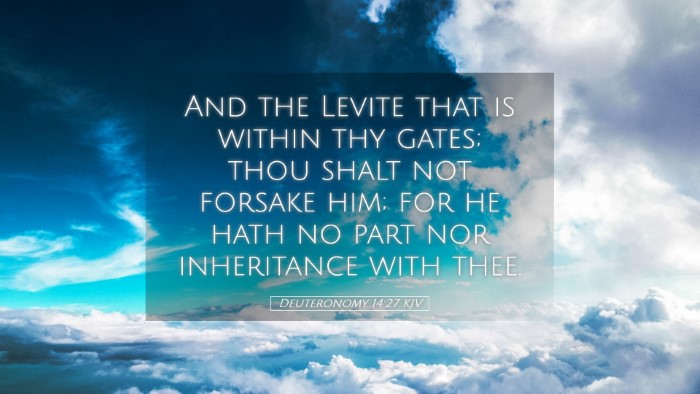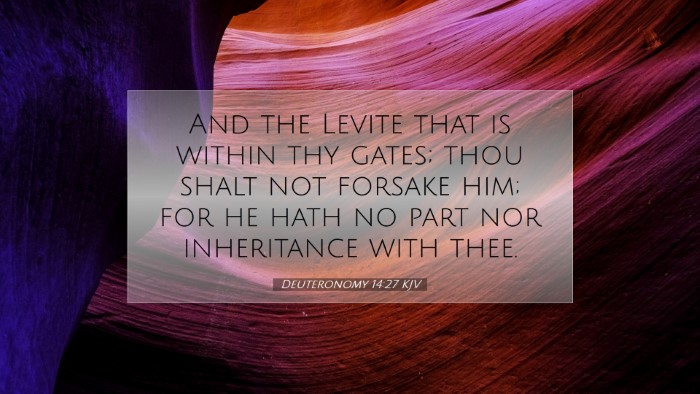Commentary on Deuteronomy 14:27
Bible Verse: "And the Levite that is within thy gates; thou shalt not forsake him; for he hath no part nor inheritance with thee."
Introduction
Deuteronomy 14:27 places emphasis on the Levites, a pivotal group within the Israelite community, tasked with spiritual duties and activities centered around worship and the tabernacle. This verse serves as a command from God, reflecting His concern for the sustenance of those dedicated to spiritual ministry. Both ancient and contemporary interpretations highlight the importance of community support for those who serve in religious contexts.
Analysis of the Verse
The divine directive in this verse emphasizes the obligation of the Israelites towards the Levites. It highlights a theme of collective responsibility within the community of faith, urging them not to neglect those whose roles are critical for spiritual leadership and guidance.
Understanding the Levites
The Levites were set apart by God for sacred duties, and this distinctive calling is underscored by the lack of a territorial inheritance among the tribes of Israel. The absence of landownership meant that the Levites depended on the generosity of the community for their sustenance.
Insights from Public Domain Commentaries
-
Matthew Henry:
Henry stresses the Levites' unique position in Israelite society. He notes that since they could not claim land for themselves, the community's support was vital. He interprets this command as a reminder of the Levites' role in maintaining Israel's relationship with God, further asserting that neglecting them would mean neglecting spiritual devotion.
-
Albert Barnes:
Barnes elaborates on the Levites' duty as a service to the people, highlighting that their well-being was intrinsically linked to the health of the community's worship practices. He points out that failing to support the Levites undermines the very foundation of the worship system established by God, thus emphasizing the communal obligation to maintain spiritual leaders.
-
Adam Clarke:
Clarke brings out the socio-economic dimensions of the verse, noting the Levites’ lack of inheritance as a reflection of their spiritual commitment. He reasons that ensuring the Levites were not forsaken guarantees the continuity of divine worship and reveals the people’s commitment to God through their support of religious leaders.
Theological Implications
The theological implications of this verse are profound. It directly connects the health of the community's worship and relationship with God to its treatment of its spiritual leaders. Thus, it calls into question the ethical responsibilities of congregations towards their pastors and ministry leaders today.
Community and Ministry
The communal aspect of ministry is emphasized throughout Scripture, and this verse serves as a poignant reminder for contemporary believers. It reinforces the notion that the physical and spiritual well-being of the Levites—and, by extension, church leaders today—is a collective responsibility that entails not just financial support, but also spiritual encouragement and respect.
Application for Modern Believers
-
Support:
Churches and congregations must actively ensure that their leaders are financially and spiritually supported, recognizing the sacrifices they make on behalf of the community.
-
Honor and Respect:
Just as the Israelites were instructed not to forsake the Levites, modern congregations are called to honor and respect their pastors, acknowledging their vital role in spiritual health and guidance.
-
Shared Ministry:
The verse also serves to remind congregants that they share in the ministry; they are co-laborers with their pastors in advancing God’s Kingdom through mutual support and encouragement.
Conclusion
Deuteronomy 14:27 offers significant insights not only for ancient Israel but also for contemporary believers. The command to sustain the Levites reflects God's heart for those who serve in spiritual capacities. Understanding this verse encourages a culture of support and honor within today's churches, emphasizing that maintaining strong leadership is essential for the community's spiritual vitality and responsiveness to God's calling.


